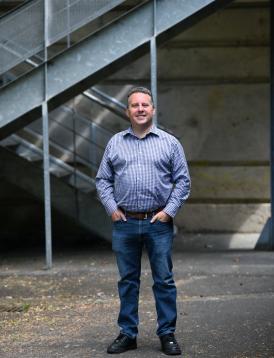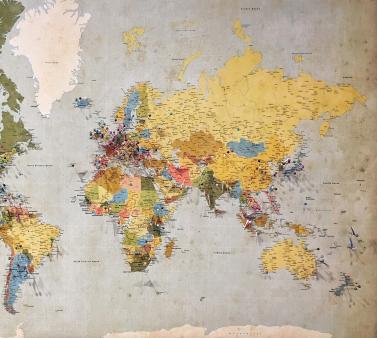
Would you mind telling us about your research field and some of the latest topics you've been working on?
Geoffrey DeVerteuil (GDV): Yes, I work mostly around urban and social geography. Urban geography is mostly about inequality. To put it briefly, it’s looking at issues surrounding class. I examine and analyze the urban social fabric, looking at research questions from the economic, political, social, and geographical perspectives. Always putting the issues we investigate back in their urban contexts. I'm actually writing a textbook right now on social geography, which should come out next year.
I also do a significant amount of work in health geography, which is one reason I'm here actually at Rennes 2. One of the Rennes 2 faculty members who invited me here and whom I’ve known for nearly 15 years, Anne-Cécile Hoyez, is also a researcher who works mostly in health geography. I've had a long-standing interest and legacy of work in that topic – looking at concerns related to mental health and substance abuse treatment for example. Drug addiction is a topic that I find particularly interesting and that's unfortunately not going away anytime soon.
Could you please tell us more about health geography?
G.D.V.: Yes. We look at what makes people healthy, including their overall well-being. The field also incorporates the concept of happiness, but given my interest in substance abuse and mental illness, I also dive into the sub-discipline of medical geography. Medical geography is more specific and involves looking at things like disease outcomes and its interactions with the planning and provision of health services, often with a focus on the spatial organization of thesesystems. It’s more quantitative and on things like violence and death rates. These are things you have to balance with well-being and the idea that people can make themselves healthy no matter what if they just have the right focus. This may be true for some people, but not for most. Actually - there's a lot of things that are out of our hands. Pollution, stress, the number of physicians per capita… these are concrete factors that have the most influence on our health.
Beyond the work you do with Anne-Cécile Hoyez, Rennes 2 Researcher and co-lead of the ESO-Rennes research center, are you meeting or collaborating with other researchers while here?
G.D.V.: Yes, I’m also working a lot with Rennes 2 Associate Professor Antonin Margier. Without knowing it was him, we started working on a paper together last week and I’ve reviewed some of his work in the past. He's in Montréal this week, but I'll see him again next week and then he may come to visit me in the UK next year. I’ve also been able to pick his brain for the textbook I'm working on. He’s helping me better understand the French context which I don't know that well. In the UK, you don’t hear much news about France - except recently, with the French elections coming up. It's good to get more European perspectives because, even though I'm in the UK, I don't feel like I'm in Europe, especially since Brexit.
Antonin Margier is a social geographer who’s also interested in issues surrounding marginality and poverty. And marginality is another area that I've worked on extensively. It is still quite popular, although I feel some academics tend to fetishize it. But it's important socially, because some people are marginalized simply because of their skin color, religion, language, or place of birth.
I try to teach this to my students because I’ve noticed they too easily believe that people mostly marginalize themselves by acting crazy or through self-defeating behaviors. When in fact, people get slotted into society in various locations, which is part geographical as well. I noticed that this can also be seen here in France, although to a lesser degree than somewhere like the United States.
You also mentioned that you'll be in Paris at the end of the week. Will you be looking at some of the sites and issues relating to the Olympics? Is this something you look at in your research?
G.D.V.: Well, I’ll be doing some site visits, along with some social geography colleagues I’ve recently met. One of them works with organizations who help to assist local disenfranchised populations — so homeless people and undocumented migrants for example. So, yes, I’ll look at some of the issues as they relate to the Olympics. There are always a lot of valid criticisms to be had about the Games, but, basically, what is clear is that once they've been agreed upon, they're going to happen. The best thing that can be done at that point is to try and ensure that there are some concessions, a better deal for those who are most likely to be impacted negatively. This could include improving the transit systems in those areas or developing / refurbishing complexes for social housing purposes in the long term. But I'll see and learn more about the issues surrounding these Games when I arrive in Paris. As far as trying to advance a specific research project on the topic, these things interest me, but I’m not sure that I'm going to write anything about it in the short term.
I'm currently in a transition period where I'm looking at new projects, meeting and discussing with others. I'm only here for a month, which is not that long, but it does provide me with some time to think and read a bit. In addition to my teaching activities, I do a lot of review work throughout the year. I'm an editor for a journal called Geoforum and it takes a lot of my time. But it’s a good way for me to keep on top of things and discover new authors and ideas.
You mentioned you were holding a talk towards the end of your stay. Could you tell me about that?
G.D.V.: Yes, well on June 20th, I will be giving a presentation on visual methods, something I've been looking at more recently, cities and visual methods to be exact. It’s also the subject of my book which is now under review. I have a full draft of a book called 100 Images of the 21st Century City. And for this presentation on the 20th, I'll be going over 50 images from the book in a Pecha-Kucha style. So it's not a lot of concepts or theories, but rather much more methodological, which I think people find more interesting. I'll be talking about these images focused on well-off landscapes and marginal landscapes, looking at the two styles, their juxtapositions, and how they interact over time. I've been taking pictures of the same places, sometimes for 30 years now. Mostly in Montréal at first, but I’ve now done many other cities. I travel quite a bit and try to go back to the same places and retake photos, which is similar to the work of Camilo Vergara, the Chilean-born author, photographer and documentarian. In his various works, he documents cities like Detroit, Chicago, New York, Los Angeles and others. His original book, from 1995, was The New American Ghetto and it was focused solely on disadvantaged areas over time. I found it absolutely fascinating! It was an epiphany for me when I read it. Hopefully, my book will be an occasion to inspire others.
Geoffrey DeVerteuil will give his presentation on June 20th, in the Geography Department (B Building of the Villejean campus), from 2 – 3pm.




